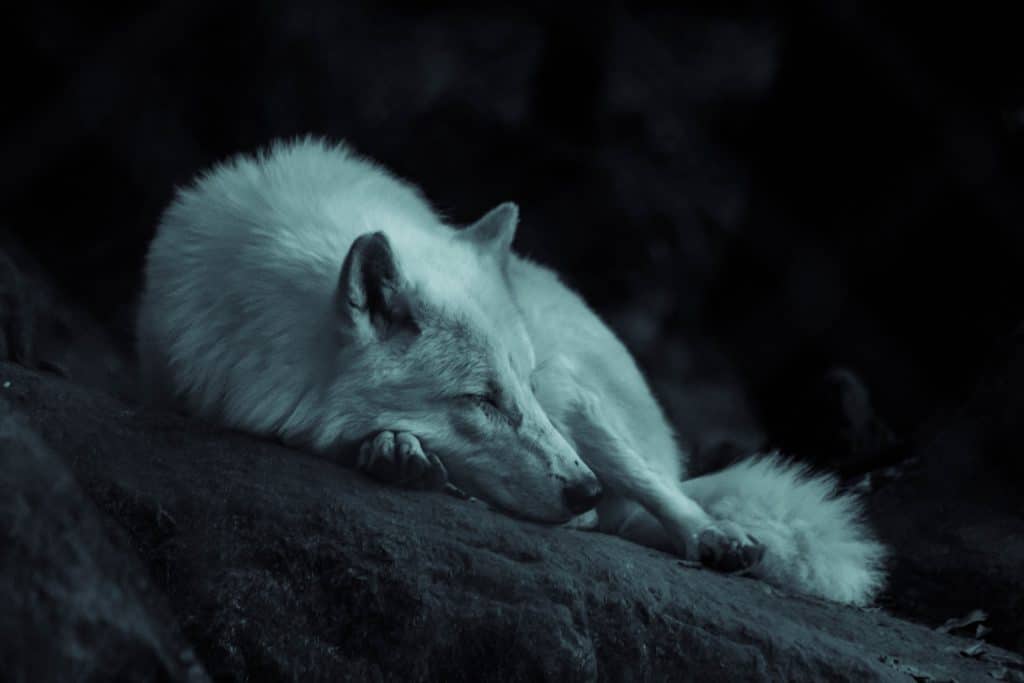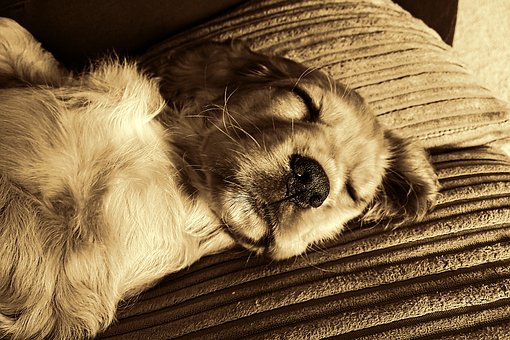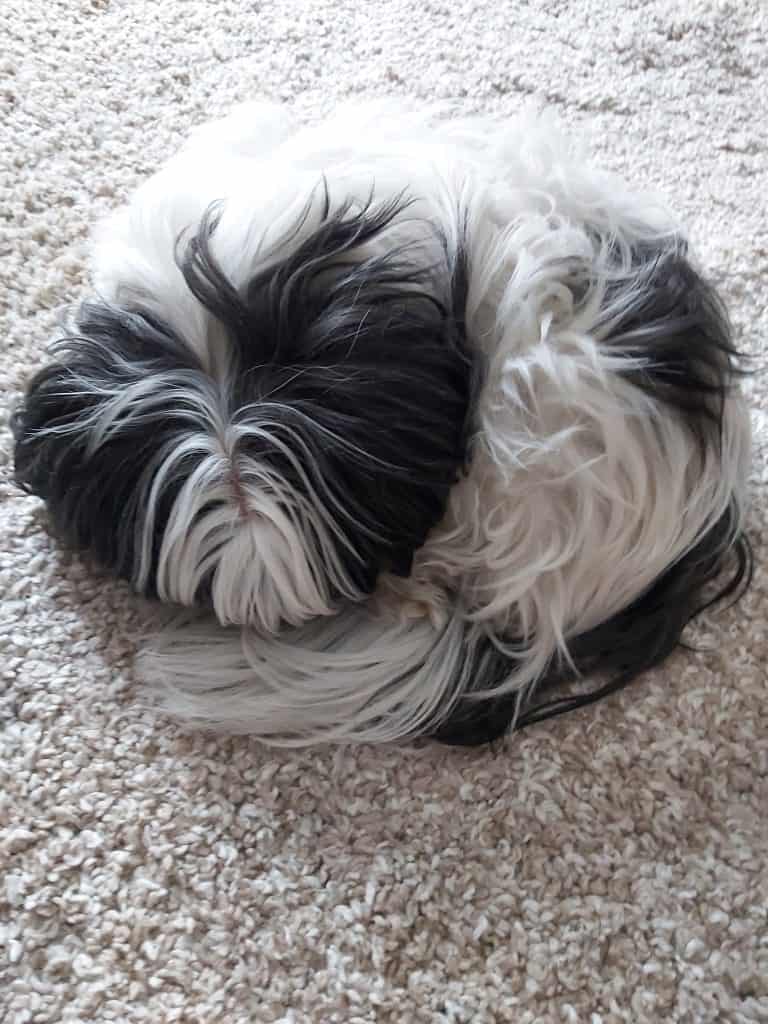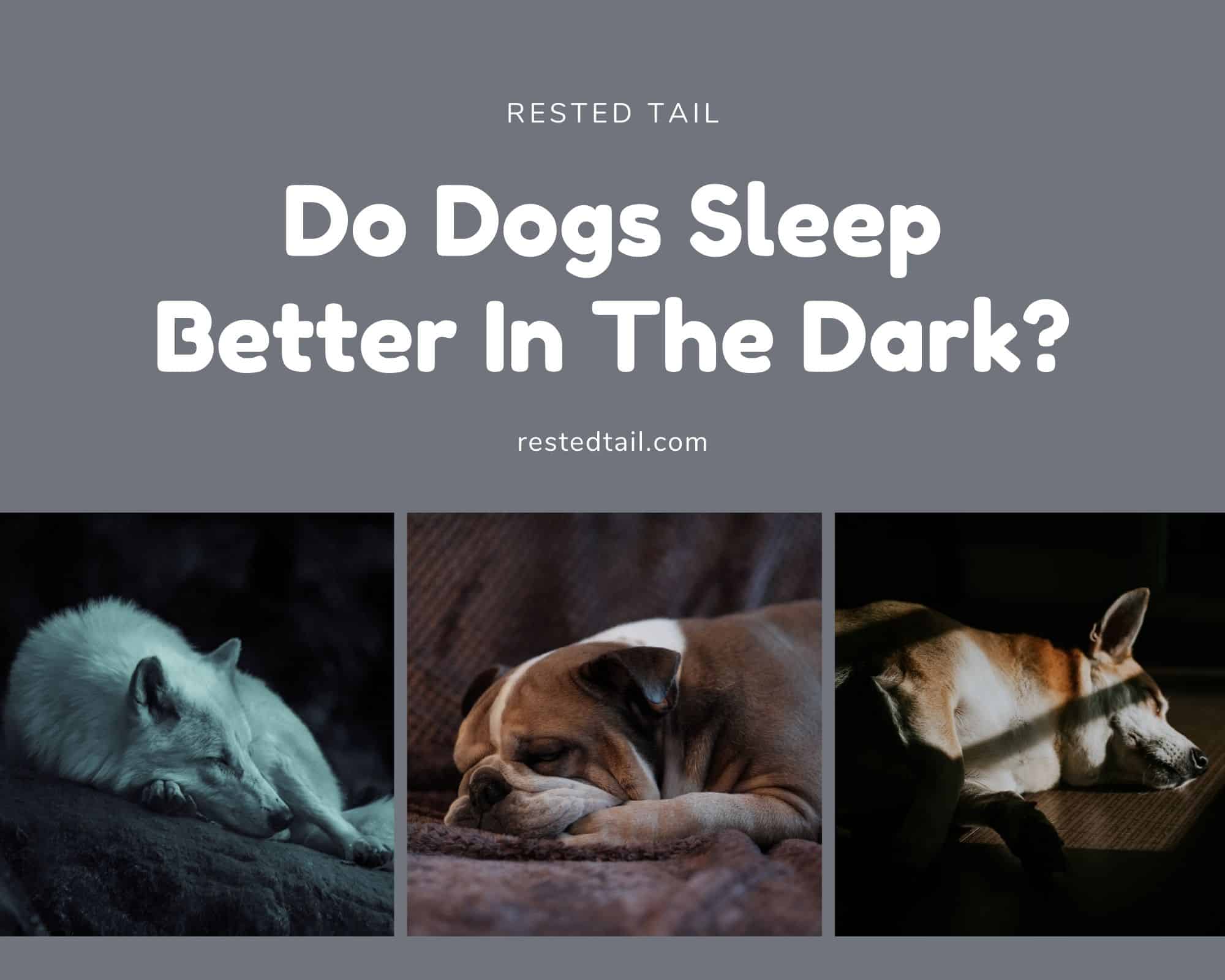If you’re like many dog owners, you’re wondering, “Do dogs sleep better in the dark?” It’s a valid question that has a few different answers. In this post, we’ll answer your questions about whether or not your pup should be sleeping with a little bit of light vs. going to bed in complete darkness.
First, let’s talk about why it might matter what time of day your pup is sleeping during their restful hours.
For one thing, if they are used to being awake for most of the day and then go to bed at night when it is already reasonably dark outside, they may get anxious from the change in lighting and want company while they are trying to fall asleep.
This can lead to the doggy version of insomnia, which is not a good thing.
On the other hand, if they are used to being awake during the day and then go to bed at night when it’s still light out, there may be some adjustment as well for them–though most dogs will quickly adjust after just one or two days.
Do dogs need darkness to sleep?
There are some benefits and disadvantages to doggies sleeping in the dark. Let’s explore them below:
Dogs who sleep with the light on may experience lower levels of anxiety because they can see, which is comforting for many pups. However, it might be a little bit more difficult for your pup to fall asleep if it’s a light that is too bright or harsh.
Dogs see better in the dark, but it tends to be more comforting for a dog if there is some light:
- Keeping lights on while your dog sleeps at night will make them feel safe and comfortable
- It’s important to understand how much light you need for your particular breed of dog.
They may have more difficulty adjusting to sleeping while someone moves around.
They can’t see anything happening outside of the room where they are resting, such as people coming and going down the hallway or stairs; which might cause some anxiety from being disoriented about what’s happening at night time.
If your dog already has trouble seeing in general, darkening the room may not help. This could produce an anxious response from your dog when you turn off the lights.
What is sleep deprivation, and how does it affect dogs?
Sleep deprivation is the condition in which an animal does not get enough sleep.
Many symptoms can suggest if your dog lacks sleep, such as excessive panting and difficulty maintaining regulation body temperature.
Sleep deprivation affects dogs because they cannot tell you how much they need to sleep.
Therefore, owners can figure out their pet needs based on observation and knowledge about their behavior patterns.
Lack of sufficient deep sleep at night affects dogs because they often awake before obtaining a complete cycle.
The dog may be fatigued during the day, which can cause accidents and sleep deprivation.

Dog sleep best practices:
Dogs should be allowed to nap and sleep when they please.
They must break from being physically active when they need one to stay healthy throughout the day.
For dogs that spend all day inside, give them some exercise before bedtime; even just a walk around the block will be helpful for them.
It’s also helpful for dog owners to keep lights dimmed low instead of bright while they doze off at night.
In the morning, it’s crucial to gradually wake up with light for your pet dog to avoid any disruption of its natural circadian rhythm during daylight hours.
Though it may be difficult, you should not force your pup out when they do not want to go out! An exhausted dog needs time to wind down.
Otherwise, this could lead to behavioral issues such as excessive barking at nighttime which can disturb neighbors and your family.
Also, it causes separation anxiety problems by making them feel isolated due to a lack of daily exercise time outdoors.
How to help your dog get a good night’s rest?
To help your dog get a good night’s rest, you should do the following
1-Offer your dog a comfortable and sound-proof place to sleep: Allow your dog to create its own safe, darkened environment.
Dogs like having their own space, and it will make them feel more relaxed while they sleep at night. They may also better behave if given an area where they can do some of their doggy doings.
2-Give them plenty of exercise during the day so that their body will be tired enough for a good night’s rest.
If your pup has not been active for a long time, do not push them too hard. Slowly build up their stamina and fitness level over time so that they can sleep better at night.
3-Feed your dog healthy food with plenty of protein to keep their muscles strong and give them the energy they need to do one more lap around the house before bedtime.
4-Consider a dog bed that is comfortable and cozy so that your pup will be less likely to doze off and fall, or jump out of the bed.
5-Make sure they have plenty of fresh water so that their thirst does not keep them awake at night.
6-Give them a stuffed toy for comfort as well – some dogs find it soothing to cuddle with a soft object before dozing off.
You should also avoid doing the following:
-Do not feed your dog just before bedtime because this can make his stomach upset which could cause him to go potty in his sleep and wake up from feeling cold on one side due to wet blankets/sheets.
Dogs do not have good control over their bladder during deep sleep (REM). You may see signs such as a slow or restless dog at night, pawing the ground, and making noises in his sleep.
-Do not leave the TV on when your dog is trying to sleep since this can stimulate his brain and make him more restless.

The importance of exercise for our furry friends.
One of the best ways to keep your dog mentally and physically healthy is exercise.
Dogs are natural hunters, which means they do not want to be cooped up inside all day long! They need a chance to stretch their legs, chase a squirrel in the park or just run around in the backyard.
Exercise is a great way to keep your dog content at home, as well as healthy and happy.
Dogs are humans’ best friends, and many of us want to keep them healthy. Dog walks give dogs a sense of freedom that they would otherwise not have in cages or at home all day. Dog owners need to get out there with their pets!
The benefits of walking your pup extend beyond physical health, too – increased energy levels, healthier bones, lower blood pressure, and even less chance depression will be an issue.
It doesn’t matter how far or fast you walk per se; instead, make sure your pet is comfortable by gradually increasing distance and speed.
Why do some dogs need more sleep than others?
Many factors determine how much sleep a dog needs. Dogs do need the right amount of exercise and enough time outside and mental stimulation to feel refreshed the next day. For example, dogs who stay inside all day without any outdoor exposure will be more likely to oversleep because they do not get their body’s “buzz” from outside.
Factors that can affect the amount of time spent napping: is it puppyhood, old age, sicknesses such as obesity, or leukemia?
Some breeds even have an inherent predisposition towards sleeping more than others.
Of course, hours and hours of sleeping can also be a sign of a problem. Many diseases and age-related problems can come with a change in sleeping patterns. Stress and separation anxiety can also manifest in extra daytime snoozing.
It’s best to talk to your vet when you have these concerns.
Do dogs sleep better in the dark or with the light on?
We’ll answer this question in full detail.
With doggy sleep being so important, it’s good to know if our dog will feel better with some light or not.
Dogs often sleep better when provided with complete darkness from their surroundings.
To get the most out of your dog’s night hours, they should sleep in complete darkness. Turning off all light sources and only leaving on dimmer lights will help regulate their circadian rhythm – which means better rest for you all!
There are both benefits and disadvantages to doggy sleep in the dark.
With the light on, our dogs will be happier because they can see what’s going on around them. With darkness, their brain can rest more efficiently.
So do dogs feel better when it’s dark or not? Well, that depends if your pup has a fear of the dark.

Some doggy sleepers will feel content when they can see what’s going on around them.
If you have a dog that is very scared of the dark, then it would be much better to keep some lights on in your house for their sake. If not, doggies need more support than just darkness and require little light to help sleep.
“From my experience, I’ve found that a bit of light makes it easier for my Shih Tzu to fall asleep.”
Darkness often produces a calming and relaxing response that signals it’s time to rest.
While dogs spend a lot of the day in dreamland, they sleep more at night due to their increased awake time during the daytime.
The best way to let your pet get enough Zzzs is by making sure it has access to dark and quiet surroundings!
Are dogs scared of the dark?
There is a common myth that dogs are scared of the dark. However, there’s no objective scientific evidence to prove this, and it may just be an old wives’ tale!
Dogs do have good night vision meaning they can see pretty well at nighttime or in low light conditions – but do not expect them to spot things like our eyes do during the day.
Some dogs do find it comforting to sleep in the dark, while others do not seem to be bothered by any lighting conditions at all – although this may depend on your dog’s breed or age.
Some breeds are more sensitive than others and will react better with a bit of light present, while some breeds prefer total darkness for sleeping, so there’s no harm in experimenting to see what your dog likes.
You could also keep some nightlights on throughout their sleeping area for added safety.
Tips to get your dog to go to bed at night.
1. Make sure your dog has enough exercise during the day.
2. Play with your dog before bedtime to tire him out.
3. Give your dog treats and praise when he goes into his crate or kennel at night.
4. Put toys in the crate or kennel, so it becomes an inviting place for sleeping.
5. Consider buying a new, comfortable bed for your pet – you’ll be glad you did!
6. Create a bedtime routine that includes going to sleep at the same time each evening and waking up at the same time each morning.
7. If you have a problem getting your pup to settle down, try putting calming scents near him (lavender is one suggestion) or use white noise machines.
8. Enroll in a dog training program. Check our recommendation down below.
9. Remember that consistency is vital- keep these tips in mind every single day until they become a habit!
Dogs are creatures of habit 😉
Brain Training For Dogs
Training your dog can be a real challenge, especially if you don’t know where to start or what approach to take.
Many people give up on training their dog because it’s too hard or they don’t see any results. And even if you do manage to train your dog, the behaviours often only last as long as you’re actively training them.
Brain Training for Dogs is different. This program is based on scientific principles that have been proven to work time and time again. You’ll learn how to engage your dog’s intelligence, encouraging and empowering them to develop lovable, consistent behaviours much quicker – and with far less effort.
Check our complete review here.
Do Dogs Sleep Better in the Dark Conclusion.
Dogs do not sleep better in the dark. When we turn off all light sources, doggies will get a good night’s rest due to their circadian rhythm of sleeping at night and being awake during the day.
However, some doggy sleepers have anxiety when it’s completely dark, so little lights can help them calm down, while others do not seem bothered by the lighting conditions.
Some breeds are more sensitive, so they require a bit of light, like my Shih Tzu, while other dogs do not need any lights on. You need to experiment and see what your pet likes best. Keeping some nightlights in their sleeping area can also help them feel safe.
If you do have problems getting your doggy to settle down, try putting calming scents or using white noise machines because dogs are creatures of habit, and they will respond better if they repeat the same routine daily.
Featured Photo by Gadiel Lazcano
Recent Posts
As a dog owner, you want to ensure that you take proper care of your furry companion. A common question that many pet owners have is, "Can I walk my dog 30 minutes after eating?" Understanding the...
Have you ever considered getting an elevated dog bed for your furry friend, but wondered if it's worth the investment? If so, you're not alone. As dog owners, we all want to provide the best care for...

